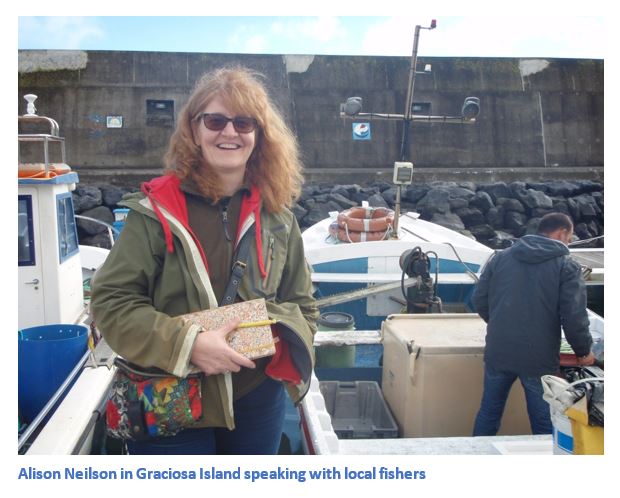News
CES supports social and environmental sustainability project Photo-narratives from small-scale fishing in the Azores Islands
2019
The Centre for Social Studies (CES) is undertaking a campaign to promote the social and environmental sustainability of the small-scale fishing communities of the Azores Islands, Portugal. This project uses the results of long-term research and transforms it into public outreach. Through strong images that counter the myths about the ocean crisis, this project helps amplify the voices of the people struggling to protect their culture, way of life and the wild fish in the ocean.
CES researcher, Alison Neilson, has been studying the Azores fishing communities and the importance of their values, culture and knowledge for sustaining the oceans, wild fish and the future of their livelihoods since 2008. Along with colleagues from the University of the Azores, she began interviewing people who made their living from fishing the deep waters of the middle of the Atlantic Ocean. Even though some families left the islands for financial security in Canada or the US, she heard stories of the strong need for the sea and the eventual return to the archipelago.
“The sea, for me, is everything. I am nothing without the sea. The sea is everything to us.” [Rúben Dutra, 2009, Santa António, Pico]“I went to America for 3 years, but my husband could not stay longer for missing the sea.” [Filomena Azevedo, 2009, Porto Judeu, Terceira]
Alison learned about fisheries research done by local associations, the creation of organisations for women in fisheries as well as innovative fishing tourism initiated by the fishing communities. This began a series of collaborations with these associations to share the stories locally as well as investigate the impact of fishing policies that serve unlimited profit and growth of large industries over the needs of local community and sustainable fishing. Together, they developed various educational activities including teacher training and art project about the sea. With fishers from all 9 islands, this university-community partnership hosted a gathering of international scientists with local fishers. In discussions about education, the fishers identified the need to better include their perspectives in school lessons which tended to educate children to leave the fishing communities. They spoke about the ways that school promoted the long held myths that small-scale fishers are poverty-ridden and selfishly overfish the ocean so need to be helped to get alternative jobs.
With the belief that research should serve social justice, Alison with doctoral candidate Rita São Marcos has continued collaborative research with community members, since joining CES in 2014. The project “Casting nets for social inclusion: Weaving partnerships and projects across the sea” with EEA bilateral funding from the Gulbenkian Foundation, revisited the issue of public understanding of fishing and ocean crisis. Since that time, these researchers with the help of the fishing communities have been sorting through the hundreds of photos and hours of interview data to create a collection of stunning photo narratives which offer
A connection to the sea and our food via a spotlight into the everyday lives of people otherwise invisible against the international stories of overfishing;
An introduction to people who chose to live in tune with ocean ecosystems in order to gather the last global source of wild food; and
A Discovery of hope amongst the common narratives of environmental destruction and crisis that there still exists working solutions.
You can help bring these narratives to light by donating to the crowdfunding campaign which seeks funds to publish these diverse stories from all nine islands available in both English and Portuguese versions.
Proceeds from book sales will support Azorean communities. Sharing the links widely will also contribute to the broader education campaign about blue commons, social justice and the sustainability of small-scale fishing.
Around the world, more than 90% of fishing people use sustainable methods, yet struggle to survive remains untold. Despite threatened, they are very much alive and kicking.


